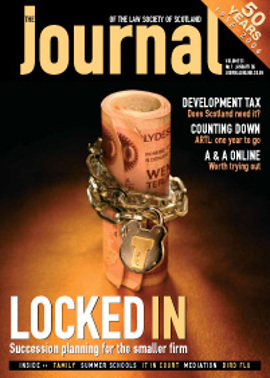Advice in a Europe of many notions

In September, we attended a 12 day summer school at the University of Salzburg in Austria. Our travel and accommodation costs were generously funded by the Clark Foundation for Legal Education. We were accompanied by Dr Andrew Steven, one of our lecturers and the Scottish teacher at the summer school. The event was run as part of the European Union’s Socrates scheme and its theme was European Private Law. Around 60 students attended from 15 different countries.
During our first lecture, Professor Michael Rainer of Salzburg presented us with two key questions:
- Why do we have so many different legal systems in Europe?
- Should we continue to have so many, or should we harmonise and have a European Civil Code?
These questions were debated throughout the summer school, and our experience at lectures and workshops gave us the opportunity to consider them in depth.
Dangerous diversity
While globalisation is undoubtedly making our world smaller, this process has been more extensive within Europe, creating new challenges for the legal profession in Scotland. Increasing numbers of clients are likely to be dealing across national borders and requiring advice beyond domestic legal systems. All Scots law graduates have a basic familiarity with European Community law, but that focuses mainly on public law. Problems in commercial dealings are far more likely to arise in private law.
Despite a common heritage shared by European systems (with the exception of our southern neighbours), some significant differences wait to trip the unwary. In German contract law, for example, an offer is irrevocable unless its terms provide otherwise. While you may revoke an offer in France or Italy, you may be liable to pay damages to the offeree as a result of doing so.
In the field of securities and property law, the differences are even more wide ranging and deeply embedded. Systems of transfer of title vary across Europe and this may even affect companies dealing within Scotland if one of them has property outside the UK. The purported extraterritorial effect of the floating charge would give the charge holder an interest in understanding when exactly property has been transferred by the relevant company. In France, this would be on conclusion of the contract, but a separate conveyance would be necessary in Germany and the Netherlands. In Sweden, the very question might be regarded as senseless because her legal system rejects a general concept of transfer of title.
It might be suggested that many problems, particularly in the field of contract law, could be solved with a choice of law clause. Trading partners, however, have an equally strong interest in ensuring that home rules apply and they may have a stronger bargaining position than the Scottish party. The few examples above highlight the problem that exists.
A Pan-European solution?
These difficulties are, of course, being felt across Europe and have led to many academics advocating the harmonisation of European private or commercial law into a single code. Such a project undoubtedly has merits – it provides a useful mechanism for reappraisal of existing rules within national systems and offers suggestions for reform – but it faces serious difficulties.
The Lando Commission has succeeded in developing the Principles of European Contract Law (PECL), which is something akin to a model contract code for Europe. However, the code represents an amalgam of many different private law systems, and it will be difficult, at least in the short term, to convince states to adopt the code in its entirety, particularly in controversial areas where compromises had to be reached. The difficulties of agreeing which rules should be chosen are also demonstrated in divergences between the PECL provisions and those presented in the UNIDROIT Principles of International Commercial Contracts.
Contract and commercial law are the areas where progress has been greatest, but, as bitter experience will tell many practitioners, when contracts start to break down questions of delict, unjustified enrichment and property law quickly come to the surface. These areas are far from achieving even the relative agreement of the contract community.
Such differences should not necessarily be put down to blind legal nationalism. As we learned in our summer school, a common legal culture is necessary for an effective and meaningful set of legal principles. The existence of such a culture is highly questionable even in western Europe, to say nothing of the new additions in the east.
Practical problems
A look ahead also discloses a few potholes on the road towards a European Civil Code. Not the least of these is its political sensitivity. Given the uproar which surrounded the loss of individual currencies (and which threatens to be repeated in Britain should we ever contemplate such a step) it seems hardly likely that an attempt to replace national legal systems with a sort of legal Esperanto would be generally welcome.
The resentment would not stop there. A single code would not itself be sufficient to ensure consistent private law throughout Europe. France and Belgium began with the same code but case law development since 1804 has led to some significant divergences. The prospect of the Court of Session having to read and take account of decisions of the French or German superior courts would not, we suspect, be a happy one for many in the Scottish legal community. In fact, to achieve genuinely consistent application, it might be necessary to found a European Private Law Supreme Court, along with a consistent pan-European attitude to precedent which, at present, is notable for its absence.
The project would also impose significant costs on the legal profession, which would be passed on to clients. Retraining would be required, as would either a much higher level of linguistic competence or large scale translation if a wider knowledge of case law became necessary.
Increased understanding
In the short term at least, it seems that there will be no panacea-code which addresses these difficulties. However, a partial solution might be hinted at by the Scottish experience of dual qualified lawyers. It is clearly unreasonable to expect full legal advice on foreign systems to be given by Scottish solicitors and, given risk management considerations, this would be unwise. Nevertheless, an understanding of other systems would enable home based solicitors to interpret advice given by a foreign lawyer to a client more familiar with the Scottish system. In certain circumstances, it may also be possible to suggest whether or not the cost of foreign advice would be worthwhile. Moreover, an understanding of foreign concepts may provide an extra tool for litigators when considering the effect of new directives and other EC legislation, which often draw on aspects of the law in other member states.
Practical experience of cross-border transactions is obviously essential for such expertise and could only be built over a period of time, but it is desirable that the foundations are laid during university. Comparative courses or comparative elements in the LLB; an Erasmus/Socrates year studying in a foreign university; or a summer school along the lines of the one which we enjoyed in Salzburg in September could all have a role in laying such foundations.
With regard to the first option, it seems that the element of legal culture is less firmly inculcated through such teaching than it would be with courses taught by teachers “native” to the relevant legal profession. Such a feeling is key to the familiarity and confidence necessary for efficient research into problems arising in practice. In addition, whilst teaching such matters as part of the existing LLB would reach a greater number of students, there would be a significant risk of overloading the undergraduate degree, perhaps undermining understanding of Scots law. Such expertise would not be a universal requirement of the LLB student any more than knowledge of English law is at present. The efficiency of making it compulsory for every potential solicitor is questionable.
Gaining confidence
A year abroad is undoubtedly a great experience, providing a level of depth to which the summer school method could never aspire. The correlative cost of this is loss of breadth, as only one system is covered.
Summer schools offer information on a wide range of legal systems in a very short space of time. It was not possible to explore any system in depth, but we began to appreciate the similarities and differences between the legal systems, and gained the confidence to acquire a greater degree of specific knowledge should the need arise. The opportunity to meet and debate with people from other countries was invaluable. Summer schools, such as Salzburg University’s course, are excellent preparation for potential lawyers facing the challenges of growing European trade. We feel that attendance at such events is highly beneficial, and deserves the support and encouragement of the legal profession. The Salzburg summer school has run for six years. We were the first Scottish students to have attended. We hope that many others will follow.
In this issue
- Pressing ahead
- Regulation, 2006 style
- Held to ransom?
- A world turned upside down
- Quiet revolutions
- For supplement read tax
- Why mediation is a bad idea, and other myths
- Advice in a Europe of many notions
- At the touch of a button
- What sort of courts do we want? (And when?)
- KM in practice
- If the bug bites
- Refreshing risk quiz
- The partnership must go on
- First duty to the court
- A difficult birth
- Nuclear power no thanks?
- Due diligence
- Will less mean better?
- Scottish Solicitors' Discipline Tribunal
- Website reviews
- Book reviews
- Back to the future
- Users' IT requirements for ARTL






